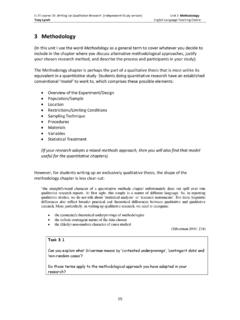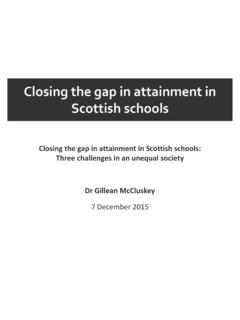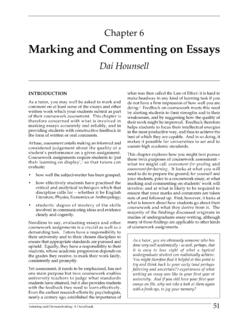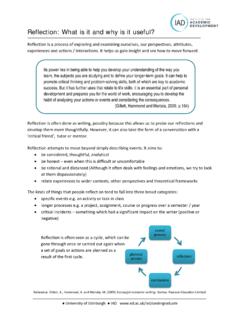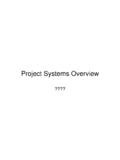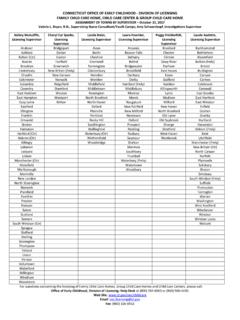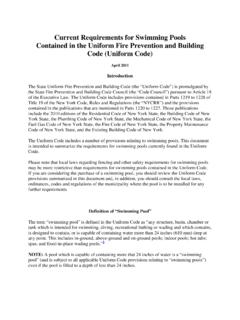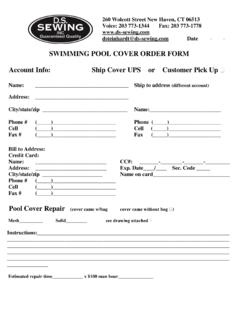Transcription of 2 The Literature Review - University of Edinburgh
1 ELTT course 10: Writing Up Qualitative Research (Independent Study version) Unit 2 Literature Review Tony Lynch English Language Teaching Centre 14 2 The Literature Review Let s begin by considering whether you need a Literature Review at all. Assuming you do, we then look at what it should contain and how it can be organised, and at alternative styles of citation. Do you need a Literature Review chapter? Harry Wolcott took a radical view of the Literature Review in qualitative research: I expect my students to know the relevant Literature , but I do not want them to lump (dump?) it all into a chapter that remains unconnected to the rest of the study. I want them to draw upon the Literature selectively and appropriately as needed in the telling of their Ordinarily this calls for introducing related research toward the end of the study rather than at the beginning, except for the necessary nesting of the problem in the introduction.
2 (Wolcott 1990: 17, underlining added) Silverman (2000: 231) quotes those words of Wolcott s, but then says that the idea of not having a Literature Review chapter at all may be too radical for most students (and their supervisors!) . He goes on to add: Nevertheless, even if you decide to write the conventional Literature Review chapter, what [Wolcott] has to say is a salutary reminder that, in writing a qualitative research dissertation, you should cite other Literature only in order to connect your narrow research topic to the directly relevant concerns of the broader research community. Making wider links should properly be left to your final chapter . Task Do you agree with the last sentence in that quotation from Silverman? Are you planning to have a single Literature Review chapter or more than one? Have you talked to your supervisors about what proportion of your thesis should be devoted to the Literature Review ?
3 Principles The Review should be written from a particular standpoint, to fulfil certain aims or express certain views on the nature of the research topic and how it is to be investigated, and the effective evaluation of documents in relation to the research being proposed (Hart 1998: 13). To achieve that, Silverman advocates what he called the four principles of Literature Review : Show respect for the Literature Be focused and critical Avoid mere description Write up the Review after your other chapters ELTT course 10: Writing Up Qualitative Research (Independent Study version) Unit 2 Literature Review Tony Lynch English Language Teaching Centre 15 Review Principle 1: Show respect for the Literature Even though you are pursuing a narrow research topic, you should not show disrespect for previous research or disconnect what you are doing from the wider debate in the field.
4 Even producers of Literature must know the Literature , and a major criterion for evaluating work is whether or not it is put in a context of prior scholarship (Marx 1997: 106). Review Principle 2: Be focused and critical Respect can only get you so far; you need to show a critical perspective on what you have read. Approach the Literature with questions and remember that your goal is to advance it, not simply to marvel at its wonders (Marx 1997: 106). Review principle 3: Avoid mere description Silverman (2000: 229) says that every supervisor has horror stories of Literature reviews which were tediously and irrelevantly descriptive , rather than analytical and critical. Rudestam and Newton characterise this sort of Review as a laundry list of previous studies, with sentences or paragraphs beginning with the words Smith , Jones , Anderson and so on (1992: 46, underlining added).
5 They go on to say that the background Literature can be described briefly, even in a single sentence, but that the most relevant studies need to be critiqued rather than reported (Rudestam and Newton 1992: 49). Review Principle 4: Write up after your other chapters Silverman suggests writing the Literature Review after you have done the other chapters. Isn t that rather an odd suggestion? Surely most students aim to complete their Literature Review before starting their research , don t they? Two possible disadvantages of writing your Literature Review too early are: Until you have completed the analysis of your data, you may not know which parts of the Literature are relevant to discussing your findings You may be tempted to think of the Literature Review as relatively easy Task Can you think of any other potential problems that might arise if you start writing your Literature Review too early?
6 ELTT course 10: Writing Up Qualitative Research (Independent Study version) Unit 2 Literature Review Tony Lynch English Language Teaching Centre 16 Content and organisation The Literature Review should provide your readers with answers to the following questions: What do we already know about the topic? What do you have to say critically about what is already known? Has anyone else done anything similar or related to what you propose? Where does your work fit in with what has gone before? Why is your research worth doing, in the light of what has already been done? Task What can go wrong in a Literature Review ? Below are supervisors criticisms of four students reviews. Read them carefully and then reflect on these questions: Did your supervisors make criticisms like those of the Literature Review drafts you wrote during your first year of research?
7 (Did they make any other criticisms?) Could any of the comments A-D apply to your current Literature Review ? A. Your draft Review is basically little more than a list of previous research papers in the field. While it is clearly well researched, it doesn t give me a sense of what has been more significant and less significant. It is hard to know where you stand . B. You have given a chronological account, which might be fine for an introductory textbook but doesn t work well as a preface to your own research. Although I know what your research hypothesis is, I don t see it informing your Review of the previous Literature . Somehow we need to see the relevant themes and issues more clearly . C. The first part of your Review deals with theory, often invoking big names from the past. The second half deals with practice contemporary empirical findings. At the moment I don t see a coherent relationship between the two.
8 D. In general, you haven t shown clearly enough what Literature is relevant, and how, to your particular research You need to prune this material drastically and to increase the space devoted to your own critical understanding of the issues, discussed in relation to what you are setting out to Your line of argument and the steps that you follow in pursuing that line need to be made much clearer; you need to impose a much more transparent structure on your discussion . (Examples A-C have been adapted from Feak & Swales, 2009: 10-11); Example D from Lynch & Anderson, 2012: 33) ELTT course 10: Writing Up Qualitative Research (Independent Study version) Unit 2 Literature Review Tony Lynch English Language Teaching Centre 17 The Literature Review needs to be organised so it leads your readers naturally and coherently to your research objectives.
9 The Review might be in one long single chapter; it might be spread over several shorter ones. Have another look at two of the thesis outlines from Unit 1: Abstract 1. INTRODUCTION AND RATIONALE 2. Literature Review 3. METHODOLOGY 4. FINDINGS 1: WHAT IMPACT DOES THIS COURSE HAVE? 5. FINDINGS 2: PRE-COURSE FACTORS AND IMPACT 6. FINDINGS 3: PEOPLE AND LEARNING PROCESSES - THEIR RELEVANCE TO IMPACT 7. CONCLUSIONS AND RECOMMENDATIONS Abstract 1. Introduction 2. Overviews of listening , strategy and interaction 3. Comprehension and interpretation in listening 4. Second language strategies 5. Conversational adjustments 6. The teachability of strategies 7. Task design for spoken interaction 8. Interactional listening strategies: a study 9. Results and discussion: two analyses 10. Conclusions Task What is different about the position and organisation of the Literature Review in those two theses?
10 Which of the two Literature reviews is structured more like the one you are planning for your thesis? Within the Literature Review , it may be appropriate to use an organising principle such as general-to-specific, chronological (narrating the development of research or debate), problem-solution (evaluating alternative solutions to a problem), or contrasting theories or procedures, etc. (describing and evaluating alternatives). Although the overall organisation of your Review chapter(s) may be thematic, it may be appropriate to use some of those patterns above for different parts of your Review . You may also choose to combine aspects of more than one pattern- for example, a discussion of alternative theories or procedures may have a historical (chronological) dimension; it might also be seen as a chain of solutions (based on previous theories or procedures) to the problem.
